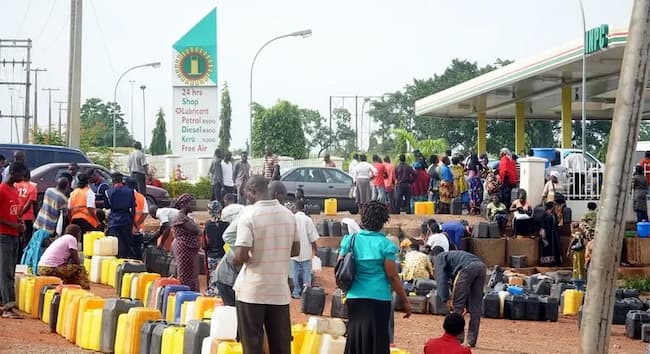Fuel scarcity is emerging in Lagos and other parts of Nigeria as private depot owners have increased the ex-depot price of petrol from N630 to N720 per litre. This price hike has exacerbated fuel shortages in Abuja and surrounding states, with some stations selling petrol as high as N900 per litre.
It was observed that several filling stations in Lagos, Ogun, and other states are out of stock, refusing to purchase the expensive fuel from private depots. Hammed Fashola, National Vice President of the Independent Petroleum Marketers Association of Nigeria (IPMAN), explained that many stations are closed because they lack fuel.
“The Nigerian National Petroleum Company Limited (NNPCL), the sole importer of petrol, should clarify the situation,” Fashola said. “Independent marketers cannot afford to buy petrol at N715 to N720 per litre from private depots and sell it at a reasonable price.”
Private depot owners previously sold petrol to independent marketers at N630-650 per litre, while NNPC supplied major marketers at prices around N600 per litre. IPMAN leaders have repeatedly urged NNPC to supply them directly, but their requests have not been met.
Fashola advised Nigerians to avoid panic buying and purchase only what they need to ensure the available fuel circulates widely.
Reports indicate that major marketers sell petrol below N650 per litre, while independent marketers sell it for N750 to N800 per litre. NNPC officials have prioritized fuel supply to Abuja, where queues first appeared on Friday, leaving Lagos and other areas with limited supply.
This development follows a Reuters report that Nigeria’s debt to petrol suppliers has exceeded $6 billion, doubling since April. NNPC has struggled with payments, affecting supply.
Additionally, some depots and marketers are not supplying independent stations due to limited allocations from NNPC. As a result, queues are reappearing in Lagos, creating concerns among residents who remember the severe fuel scarcity in May.
Visits to various stations across Lagos revealed price adjustments and long queues. NNPC stations sold at N568 per litre with long queues, while others sold at higher prices, up to N820 per litre at Petrocam.
In Ogun State, petrol prices ranged from N700 to N800 per litre amid long queues. Residents reported purchasing fuel at these high rates, indicating a return of fuel scarcity.
In Ekiti State, many stations have not been dispensing fuel, with prices ranging from N650 to N760 per litre. Similar situations were observed in Kwara, where prices varied from N600 to N750 per litre, and in Edo, where prices ranged from N700 to N730 per litre for independent marketers.
In Sokoto, long queues formed at NNPC stations selling at N620 per litre, while other stations sold fuel at N850 to N900 per litre. In Kaduna, prices ranged from N720 to N800 per litre, with black-market prices even higher.
The fuel scarcity has persisted in Abuja, with some stations selling at N900 per litre. Independent marketers struggle with the high ex-depot prices set by private depot owners, making it difficult to compete with NNPC retail stations selling at lower prices.
IPMAN President Abubakar Maigandi confirmed that the ex-depot price increase to N710 per litre has made it challenging for independent marketers to operate. He urged NNPC to increase supply allocations to IPMAN members to mitigate the fuel shortage.
The scarcity has not significantly affected remote villages, where queues are less pronounced. However, the ongoing supply issues and price disparities continue to strain Nigeria’s fuel market.













